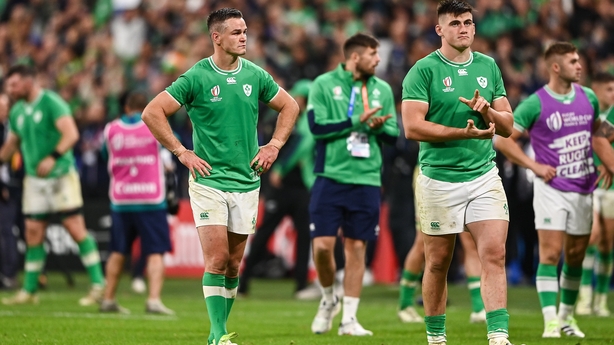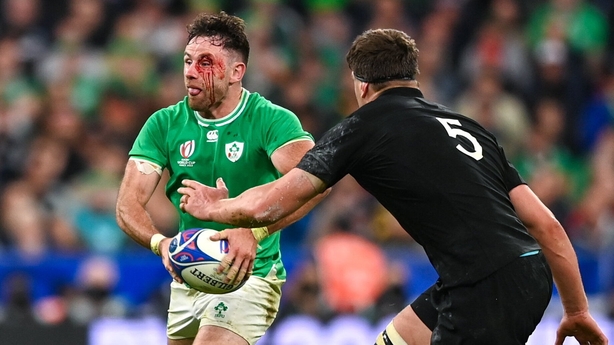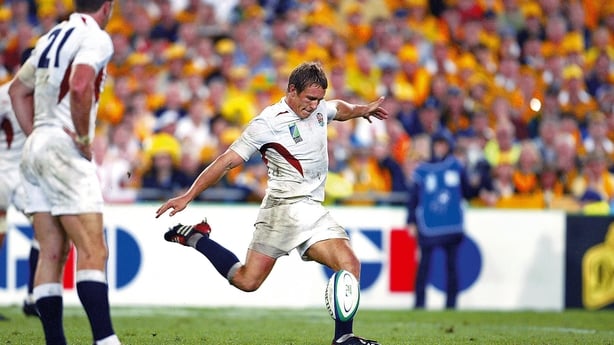You can say it came down to the bounce of a ball, the width of a post, being held up over the line but Ireland, once again, found themselves on the wrong side of the result when it really mattered.
That they were right in the game until the final play of a Rugby World Cup quarter-final – for the first time since 1991 – suggests that this was different but the tale of the tape will say it was the same dish served on a new plate.
That the team were still in the mix, in fact, made it tougher to swallow and over the next few months at least, harder to digest.
A good old-fashioned thrashing gives you some time to brace yourself. A last-gasp five-minute onslaught over almost 40 phases just makes you think they could do it. The hope that kills you.
To lose one quarter-final (like, for example, New Zealand in 2007) may be considered unfortunate but to lose eight may require deeper reflection.
Andy Farrell's men had beaten all top-tier nations over the last 16 months. Wins over France, South Africa (twice) and New Zealand (twice) were all high-octane and hard-fought.

A Six Nations Grand Slam is beautiful in its own right.
Going away to New Zealand and winning the series was described by Farrell as "the hardest thing in world rugby, by a country mile".
There’s no doubt that defeat hurt the All Blacks, a first three-Test home series loss since 1986, but it was not do-or-die. It likely didn’t have the same feel of jeopardy that the final Lions Test in 2017 did.
A team can lose one of its last three games in the Six Nations and still win the title.
What we have seen, both on Saturday night and last night was that when the stakes get raised, when a team has to win or go home, then it’s the southern hemisphere sides that are consistently able to reach that extra level, the beast mode that Ireland do not currently possess.
There was nothing between the teams and the analysis would be different had, for example, Rónan Kelleher managed to ground the ball when over the line, however, Ireland underperformed on the night.
While the pain of the players, coaches and fans is raw now, it hurts even more because, when time permits a more sober review, they will realise that across the board they didn’t reach the levels they are capable of.

That’s the killer here. Hugo Keenan (above) and Bundee Aki are probably the only two players who will feel they did themselves justice.
This New Zealand outfit had World Cup winners and semi-final winners galore. They had World Cup calibre and muscle-memory and in a game of tiny margins, that’s a big advantage to hold over an opponent.
"It’s an opportunity to change the perception of Ireland and Irish rugby, within Ireland, but also around the world," said former Ireland international Shane Horgan before the game on Virgin Media.
"Because, until we get into a semi-final, no matter how good we do in the years between World Cups, no matter how often we are world number one, we won’t really truly be seen as a world number one or a team that isn’t, in effect, chokers at World Cup."
This Ireland team, of course, aren’t "chokers" because a ball didn’t bounce for them, but Horgan has a point.
The serious perennial Webb Ellis contenders will be able to point at the record books and show that Ireland have never even reached the last four. From 10 attempts.
On the other side, England are the only team to disrupt the southern hemisphere domination of the tournament, winning in extra-time in 2003.
They again, stand alone as the north's only representatives this time around.

With just one northern hemisphere win since 1987, it’s only fair to ask how the Six Nations affects a rugby nation’s DNA.
It’s an incredible competition, first played in 1883 between four countries with France (1910) and Italy (2000) joining later. It has history, prestige, glamour and glory.
The Rugby Championship is not comparable. It’s only on the go since 1996, as the Tri-Nations until 2012 when Argentina joined.
For the last few years there’s been chatter that South Africa would jump ship if they ever got a Six Nations invite. In World Cup years they have been known to send a shadow squad on the road.
It might be harsh to suggest that New Zealand and South Africa will go through the motions for their autumn tours and in their Rugby Championship campaigns but they are invariably able to apply a laser-like focus in the battle for the Webb Ellis.
It is their benchmark.
RTÉ panel discuss Ireland's defeat to New Zealand (above)
"They had the nous and the experience coming off the bench, having been World Cup winners," said Bernard Jackman about the Springboks quarter-final win over France, which at half-time was already being hailed as the best rugby match ever played.
"We did feel two or three weeks ago it was going to be a northern hemisphere team, at the critical juncture, [Ireland have] come up short unfortunately."
The next World Cup takes place in Australia and notwithstanding the retirement of a number of senior and influential figures now, many of the foundations laid by Farrell, and all going well the coach himself, will be in place.
Players like Caelan Doris, Dan Sheehan, Andrew Porter, Joe McCarthy, Ryan Baird, Mack Hansen, Jack Crowley and Keenan, to name a handful, will be in their prime, while there will be another high-quality fresh crop to bolster the core.
And who knows, the draw might even be kinder; it could hardly be worse.
At this point, it feels like it will take at least those four years to get over this latest knock-out blow.
Watch New Zealand v Argentina in the Rugby World Cup semi-final on Friday Sunday from 7.35pm on RTÉ2 and RTÉ Player, follow live blog on RTÉ.ie/Sport and the RTÉ News app.








